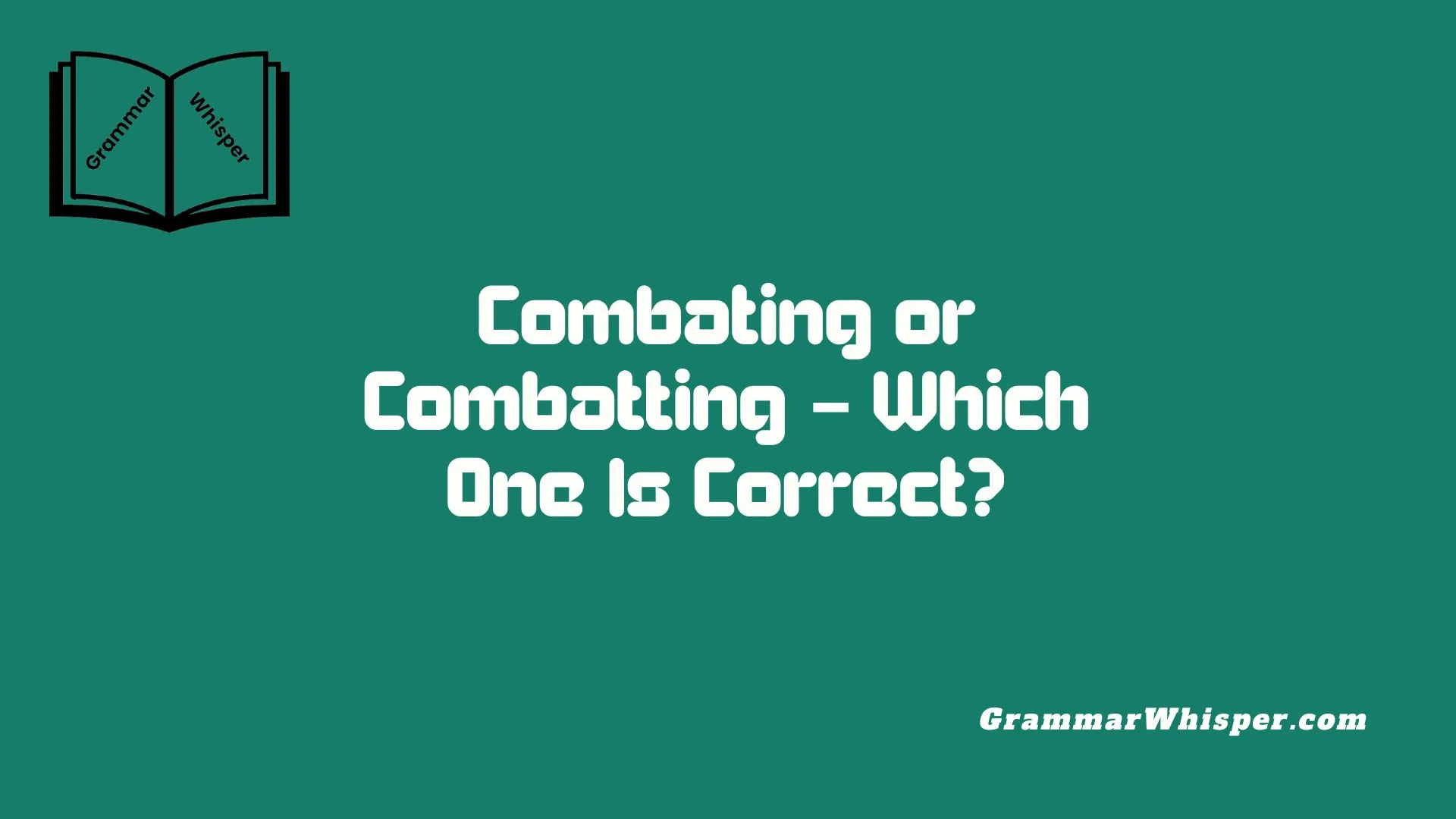You’ve probably paused while typing, looked at both “Combating or Combatting,” and wondered which spelling is correct. You’re not alone – this mix-up happens often in English. The language likes to play little tricks, especially around consonant doubling. But here’s the key: “combating” is the real, standard spelling in American usage. “Combatting,” with two t’s, may look familiar, but it doesn’t follow standard rules. This article helps cut through the noise, present a definitive answer, and show you – with grammar examples and style references – how to write with confidence.
I’ve often seen even strong writers hesitate here. That’s why a basic grammar guide can be a real tool. The logic behind this choice lies in vowel-consonant spelling rules. And while some style guides in the UK might show “combatting,” it’s still less common. If you’re aiming for clear and widely accepted language, choose “combating.” The practical advice: don’t overthink – stick with one “t.” We’ll provide all the insights you need so you can avoid second-guessing, trust the pattern, and let your writing flow smoothly every time.
The Root Word “Combat”: A Quick Breakdown
“Combat” serves as both a noun (“a fierce combat”) and a verb (“to combat misinformation”). Its roots lie in Latin combattere and French combattre. That history influences how we form its present participle or gerund, which leads us to the question: do we double that “t”?
In English, many verbs ending in a consonant preceded by a vowel change form by doubling the final consonant (e.g., “run” → “running”). But the rule isn’t universal. For “combat,” stress pattern and dialect matter.
American English vs. British English: Who Spells It How?
| Variation | Region | Spelling Used |
| Combating | U.S. | ✅ Standard |
| Combatting | U.K. & Others | ✅ Accepted but less common |
In American English, writers overwhelmingly choose “combating.” It follows the rule: one syllable, final consonant preceded by a consonant – doubling.- In British English, “combatting” appears in some style guides and literature. It isn’t wrong, but it’s not obligatory. The doubling reflects a pattern (e.g., “combatting” mimics “committing”), though “combat” stress doesn’t demand it.
Spelling Rules: When to Double the Consonant
English spelling often trips people up with its doubling‑consonant rule. Here’s a simplified breakdown:
- If a one‑syllable verb ends in: consonant + vowel + consonant, double the final consonant before adding -ing.
- Examples: run → running, swim → swimming.
- But with stress on the final syllable in multi-syllable verbs: admit → admitting.
- If stress falls earlier, one consonant is fine: combat → combating.
📌 So why do some British writers double the “t”? It’s optional – and likely a style tradition, not a grammar necessity.
Grammar Spotlight: Present Participles and Gerunds
What They Are:
- Present participle: Verb form ending in -ing, used in progressive tenses (e.g., “I am combating misinformation.”)
- Gerund: The same -ing form, but functioning as a noun (“Combating misinformation is essential.”)
Spelling of “combat” into “combating” works the same in both cases. The way you use the word (verb or noun) doesn’t change the need (or not) to double the “t.”
Audience Awareness: Who Are You Writing For?
- American readers expect “combating.”
- British or Commonwealth readers may accept “combatting.”
- International publications like EU docs? Mixes occur, so consistency matters.
Pro tip: Know your audience – whether it’s local, regional, or global – and match spelling to expectations. If you’re unsure, check your house style or publisher guidelines.
Real‑World Usage Examples
Here are real examples showing how each variant appears in context:
- Combating misinformation is a common phrase in journalism and policy.
- Combatting obesity shows up in U.K. health reports.
- Quick search data:
- Google Ngram: “combating terrorism” vs. “combatting terrorism” – American usage favors one “t”.
- Corpus of Contemporary American English (COCA): nearly all instances show “combating.”
- British National Corpus: both appear, though single‑t is still more prevalent.
📊 In short: one “t” dominates overall; two “t” holds niche ground in British usage.
Dictionary and Style Guide Verdicts
Review of leading authorities:
| Authority | Spelling | Notes |
| Merriam‑Webster | Combating | Does not list “combatting” 😕 |
| Oxford English Dict. | Both | Notes “combating” as a variant |
| Cambridge | Both | Single‑t is most common, double‑t OK |
| AP Stylebook (U.S.) | Combating | One-time only |
| Chicago Manual of Style | Combating | One-time only |
Best bet: Use “combating” unless British/UC-specific style guides allow the alternate.
Common Misconceptions and Mistakes
- “Combatting” is wrong everywhere – False. It’s acceptable in some regions, but not in U.S. style guides.
- Spellcheck will catch it – Maybe not. UK English settings may show “combating” as incorrect.
- It changes meaning – Nope. Both forms mean the same; the difference is purely orthographic.
SEO, Clarity, and Consistency in Writing
Choose one spelling and stick with it. Here’s why:
- Readers want consistency – they pick up quickly on spelling variation.
- Search engines (like Google) may treat variants separately, potentially diluting your page’s relevance if you mix them.
- Professionalism: Staying consistent signals attention to detail.
🛠️ Tools to help:
- Set your dictionary in Word or Google Docs.
- Add the “wrong” variant to AutoCorrect.
- Use Find & Replace during editing.
Bonus: Spelling Battles in Other Words
Let’s peek at similar words:
- Cancel → canceling (US) vs. cancelling (UK)
- Travel → traveling vs. travelling
- Quarrel → quarreling vs. quarrelling
🎓 You’ve already seen the pattern. Now that you understand stress + doubling rules, it’s much easier to predict the winner.
Final Verdict: Which Should You Use?
- ✅ Use “combating” for American English, style guides like AP, Chicago, or MLA.
- ✅ “Combatting” is fine if you’re writing for a British audience and your style guide permits it.
- ❌ Do not mix. Crossing out forms in a single document undermines credibility.
A Deeper Dive for Grammar Enthusiasts
Why “combat” Doesn’t Follow Typical Doubling
- English doubling often depends on stress. Words like “combat” stress the first syllable (“COM‑bat”), so doubling isn’t grammatically mandated in American English.
When British English adds a Second “t”
- While not obligatory, British orthography sometimes doubles consonants in two-syllable verbs ending in -tat or -mat (e.g., “format” → “formatting”).
Historical Roots
- Historical texts, including works by Charles Dickens and H.G. Wells, occasionally use “combatting.” Variants reflected early standardized spelling efforts. Over time, clarity and economy favored single‑t in most cases.
Case Study: International Communications Department
An NGO changed all internal documents from “combatting” to “combating” to:
- Align with U.S. donors.
- Improve search engine indexing.
- Reduce proofreading inconsistencies between U.K. and U.S. editors.
Result: Cleaner messaging and faster publish cycles.
Final Tips for Writers
- Set your default spelling: Choose U.K. or U.S. English in your writing app.
- Track your style: Keep a short style sheet if you manage multiple documents.
- Proofread with tools: Use Grammarly or ProWritingAid, but customize based on region.
- Educate your team: A quick email explaining the difference can save hours of confusion.
TL;DR Summary
- Combating → U.S. English, mainstream style.
- → Optional in the U.K., allowed but rarer.
- Consistency matters most – pick one, and use it everywhere.
Conclusion:
Choosing between “combating” and “combatting” boils down to understanding your audience, mastering regional grammar norms, and applying consistent spelling in your writing. “Combating” is the accepted form in American English and is preferred by nearly all major U.S. style guides. “Combatting” appears occasionally in British English, though even there, it’s far less common and not required.
Understanding the root word “combat,” recognizing the influence of syllable stress on spelling, and referring to established style authorities can help you make confident decisions. Above all, pick a spelling that aligns with your readers’ expectations and your editorial standards – then stick with it throughout your content.
Whether you’re combating grammar confusion or combatting stylistic inconsistencies, now you’ve got the tools to win the battle – no matter how you spell it.
FAQS:
What is the correct spelling: combating or combatting?
Combating is the correct and preferred spelling in American English, and it’s recognized globally. Combatting is a less common British English variant that is technically acceptable in some UK contexts, but it’s not standard.
Why does “combatting” look right to me?
It may seem correct due to other common double-consonant words like “committing” or “forgetting.” However, doubling occurs mainly when the final syllable is stressed, and in “combat,” the first syllable is stressed, so doubling isn’t required.
Does the meaning change between combating and combatting?
No, the meaning remains the same. Both are derived from the verb “to combat” and used in identical grammatical contexts. The only difference lies in regional spelling preference.
Will I get marked down for using “combatting” in formal writing?
That depends on your location and your audience. In the U.S., using “combatting” may be flagged as a spelling error in academic or professional contexts. In the U.K., it might pass, but “combating” is still more widely accepted. Always follow your institution’s or organization’s style guide.
How can I avoid mixing the two spellings in one document?
Set your writing software (e.g., Word, Google Docs) to either U.S. or U.K. English, depending on your audience. Use tools like Grammarly, AutoCorrect, or Find & Replace to stay consistent throughout your document
Nt.











